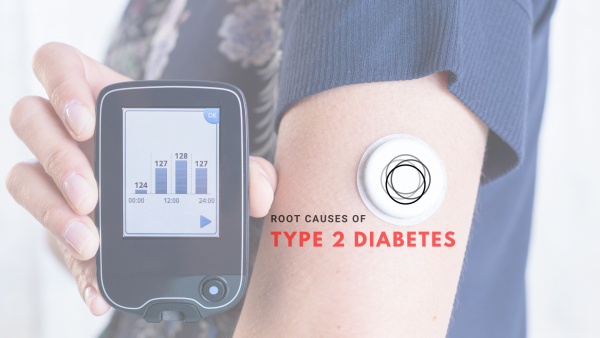
-- A large 2010 study, titled the DECODE study showed that over 90% of people in the US that deal with either Type 2 Diabetes or Pre-Diabetes will experience some form of complication in their lifetime. Although Diabetes treatment and complication management are some of the largest expenses for our healthcare system. Little progress had been made in the way these conditions were viewed and addressed. A growing body of knowledge is now helping us understand why the cookie-cutter (algorithm) treatment approach to diabetes which offers blood sugar suppressive drug at each stage of the progression is so ill-equipped to deliver long-term success. Turns out patients tend to have unique mechanisms causing the blood sugar problem, in turn, a one-size-fits-all is doomed to fail most. Indeed Type-2 diabetes is a commonly diagnosed condition, but recent diagnosis advancements have demonstrated that this disease is highly heterogeneous in nature [1]. Subsequently, the variation of clinical characteristics, risk of complications, disease progression, and treatment response has led to the identification of various subtypes that have distinct etiologies and risk profiles. To date, autoantibody testing and age-to-onset assessments as well as BMI, HbA1c, insulin resistance, and insulin secretion measures have been utilized to categorize individuals into five subtypes [1-3]:
·SAID – severe autoimmune diabetes
·SIDD – severe insulin-deficient diabetes
·MOD – maturity-onset diabetes
·MARD – mild age-related diabetes
·SIRD – severe insulin-resistant diabetes
Insulin resistance is the key etiologic abnormality that connects type-2 diabetes to its subtypes. After the initiation of insulin resistance, however, the disease becomes increasingly complex as patients develop diabetes due to a combination of factors that lead to different pathological pathways which place them on a diabetic spectrum. Specific causes of insulin resistance that result in these subtypes include chronic, low-grade tissue inflammation, the deleterious activity of proinflammatory macrophages, immune cell-mediated inflammation, dyslipidemia, hypothyroidism, and age, among many others [1-6].
Accordingly, the diversity underlying the varying mechanisms and progression of type-2 diabetes subtypes warrant different, functional approaches to diabetes treatment. More specifically, modalities such as obesity management (e.g., anti-obesity drugs), and antidiabetic drugs, as well as insulin-sensitizing therapies such as anti-TNF-alpha treatment, anti-inflammatory therapy, and IL-1beta inhibitors should be further investigated as they may provide healthcare professionals with a variety of options [2-6]. Current pharmacologic therapy that focuses on targeting inflammation-induced insulin resistance remains in the early stages of clinical research and development, which makes it difficult to anticipate how this field of diabetes management will evolve. However, it is a promising area given the number of cases that are related to uncontrolled inflammatory activity within the body.
To date, the shift toward more personalized medicine has become increasingly common in cancer treatment, but has not reached the level of evidence- and patient-centered treatment for type 2 diabetes or its subtypes. Therefore, anti-inflammatory therapy may be particularly effective for subgroups of patients with type 2 diabetes who demonstrate extensive characteristics of inflammation-induced insulin resistance [4]. This process would require the identification of specific biomarkers that can reveal sub-phenotypes within the type 2 diabetes spectrum that could predict potential responsiveness to specific therapeutic modalities [4, 5].
Functional medicine is another important alternative as it involves the combination of different patient-centered approaches to chronic disease management that aim at improving overall health by promoting homeostasis. For some patients, the combination of conventional medical management with functional medicine may be the key to completely reversing diabetes as the management of type-2 diabetes as well as its subtypes calls for more integrative approaches. The doctors at Novis Health specialize in clinical nutrition and functional medicine, which means their team of experts focuses on the healing of thyroid disorders as well as type-2 diabetes reversal. They also engage in ongoing clinical research that aims at discovering advanced treatment regimens and natural approaches that can dramatically improve the health of people who have chronic conditions. In doing so, Novis Health is positioning itself as one of the leaders in functional medicine.
Steps to a successful type 2 diabetes outcome:
1. Thorough Case Evaluation- Our initial case review and evaluation for care is unlike anything else. It includes a deep dive into what the patient is going through, what are their goals, and what are their frustrations with the current care they are receiving.
2. Extensive & Cutting Edge Testing- From hormones to leaky gut & epigenetic testing, we dive deep to uncover the root causes of disease and begin to ascertain the best treatment plan to restore the patient’s health.
3. Solving The Puzzle- Our multidisciplinary team of clinical experts gathers results from comprehensive testing; combining the findings to determine why the patient has developed a chronic disease or equip them with the knowledge as to how they can work to prevent developing one.
4. Fully Customized Treatment Plan- Every patient is a completely unique being, with unique causes and triggers for the development of the disease. It is for this very reason that the cookie-cutter “pill for every ill” conventional approach commonly falls short. An individualized roadmap is our biggest claim to fame.
To learn more or to see if you qualify for this approach visit: https://novishealth.com/
References
1.Emma Ahlqvist E, et al. Subtypes of Type 2 Diabetes Determined From Clinical Parameters Diabetes. 2020;69(10):2086-2093.
2.American Diabetes Association. 2. Classification and diagnosis of diabetes: Standards of Medical Care in Diabetes—2019. Diabetes Care. 2019;42(Suppl. 1): S13-S28.
3.Tuomi T, Santoro N, Caprio S, Cai M, Weng J, Groop L. The many faces of diabetes: a disease with increasing heterogeneity. Lancet. 2014;383:1084-1094.
4.Gregor MF, Hotamisligil GS. Inflammatory mechanisms in obesity. Annu Rev Immunol. 2011;29: 415-445.
5.Lumeng CN, Saltiel AR. Inflammatory links between obesity and metabolic disease. J Clin Invest. 2011;121: 2111-2117.
6.Osborn O, Olefsky JM. The cellular and signaling networks linking the immune system and metabolism in disease. Nat Med. 2012;18: 363-374.
Release ID: 88998141

